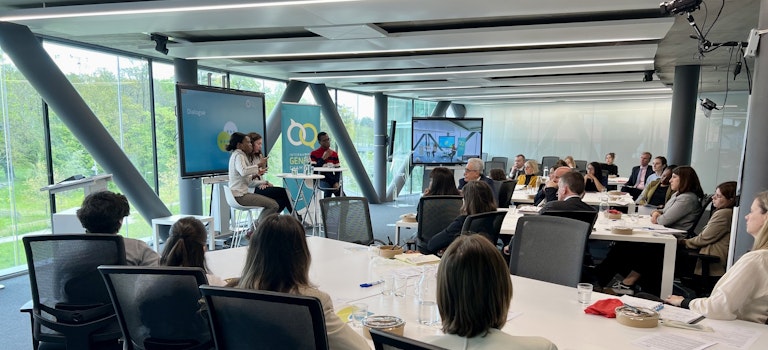On 25 April 2023, the International Gender Champions Secretariat held its first Lunch and Learn event on 'Intersectional Feminism: Dismantling Systems of Oppression'. Speakers explored intersectional feminist perspectives and promoted dialogue with attendees on how different forms of oppression intersect to shape the experiences of marginalized groups, including women from the Global South.
This event was the first of IGC’s new ‘Lunch and Learn’ series which aims to facilitate encounters between the IGC community and leading experts, academics and activists. These events are made possible through a grant from the U.S. Mission in Geneva and will take place throughout 2023. They are open to IGC focal points, Champions as well as a wider community of students, researchers and policy makers.
Moderated by Geneva Graduate Institute masters student Theo Wellington, the Lunch and Learn featured speakers Fatima Sator, Research Associate at the School of Oriental and African Studies (SOAS), and Norita Mdege, Research Fellow at the Geneva Graduate Institute.

Fatima Sator discussed her research on how women from Latin America, including Brazilian Bertha Lutz, fought opposition from Western states to ensure that the United Nations Charter addressed women's rights and gender equality. She spoke to the role of Indian and Pakistani women who fought to include gender equality in the Universal Declaration of Human Rights. Sator highlighted the lack of awareness within academia and among policymakers of the historical role that women from the Global South played in the feminist movement. She explained, "By silencing history this way, we are silencing thousands of women who are from the Global South and who resonate with these women." Sator called for research and knowledge mobilization about the work of feminists from the Global South in the UN System and beyond.

Norita Mdege presented her research on "spaces of contestation." Discussing the role of decolonial feminism in Africa, she explained, “External forces such as colonialism, such as patriarchy, they come into these spaces in such ways that they are not able to take over because they are always contested.” Mdege highlighted how common perception views countries from the Global South and women as reacting to the actions and decisions of the Global North and men rather than agents with equal roles. Instead, she argued, “We need to create spaces of interaction and contestation to get past the notion of centre and periphery in knowledge creation." Thus, Mdege promoted the integration of local knowledge and leadership into decision- and policy-making.
Event attendees followed the presentations with thoughful discussions on the role of African women in UN leadership, the role of governments with feminist foreign policies, and how academics, the UN system and media can highlight the voices and stories of women of colour. Stay tuned for future events in this series!

